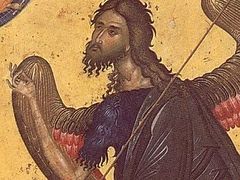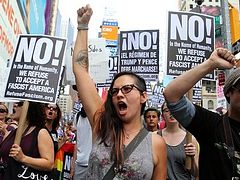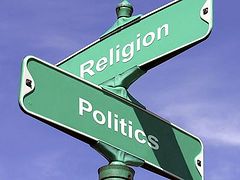Certain media demand the Church’s more active involvement into political and economic affairs and intrigues. What should be our attitude towards this? Pravoslavie.ru asks the opinion of several Russian pastors.
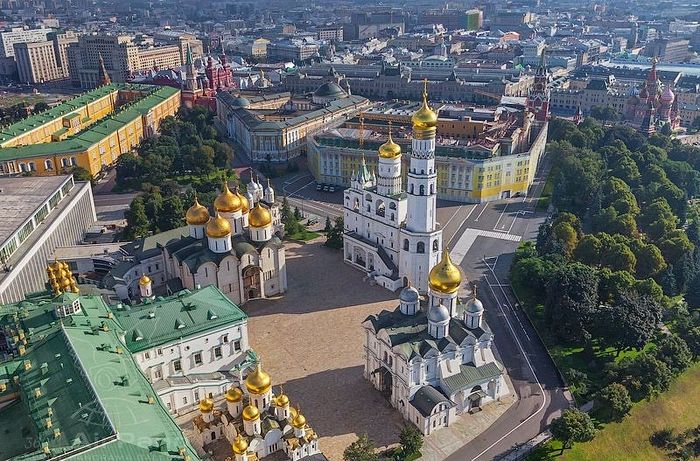 Cathedral Square of the Moscow Kremlin
Cathedral Square of the Moscow Kremlin
Priests should be very careful in their judgments and assessments
To start with, intrigues have nothing to do with us. As for our involvement in the economy, I think the activities of some of our monasteries which develop farm production are very praiseworthy. If small businesses for processing agricultural products are opened on the initiative of the faithful, then why not? This kind of activity should be encouraged.
If believers work somewhere as hired workers, then they should take part in trade-union activities on a par with everybody else. I don’t think we should oppose the rest of the team in this respect. On the contrary, matters of safety, production optimization, and the equitable distribution of payment for labor—all this should be within the sphere of Christians’ interests.
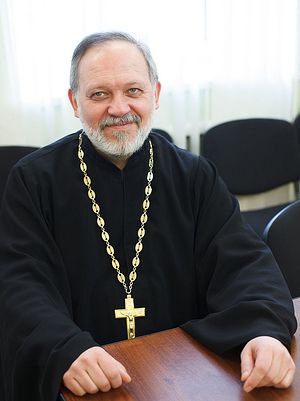 Priest Alexander Dyachenko When it comes to involvement in politics, I believe any positive activity in this field is permissible to Christians. The only prerequisite is that a Christian who is nominated to an office should not tell lies and should keep the word he pledged before the elections. As for clergy, I personally consider it impossible for myself to be involved in political affairs. Meanwhile, I have a right to have my own opinion on any political matter and even express it, but only in private conversations, and never promote any political party from the ambo in the pre-election period.
Priest Alexander Dyachenko When it comes to involvement in politics, I believe any positive activity in this field is permissible to Christians. The only prerequisite is that a Christian who is nominated to an office should not tell lies and should keep the word he pledged before the elections. As for clergy, I personally consider it impossible for myself to be involved in political affairs. Meanwhile, I have a right to have my own opinion on any political matter and even express it, but only in private conversations, and never promote any political party from the ambo in the pre-election period.
Generally speaking, priests should be very careful in their judgments and assessments of political problems and shouldn’t express their opinions about them on the internet or in the mass media. Whatever some might say about us, people tend to listen to priests’ views. Any rash statement of ours may act as a catalyst for all sorts of unforeseen events. Let us recall the infamous Fr. George Gapon1, a talented and charismatic man. But what deplorable implications his involvement in political affairs had for the Russian state!
The Church should be higher than politics
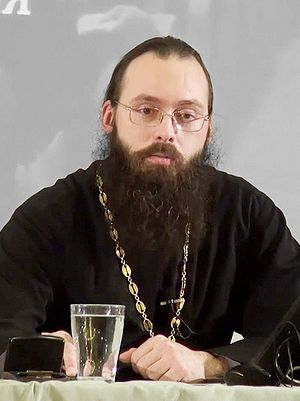 Priest Valery Dukhanin Our primary task is to not judge anybody. If someone from our Church hierarchy maintains contacts with the powers that be, then it should be so and it could be for some benefit of the Church.
Priest Valery Dukhanin Our primary task is to not judge anybody. If someone from our Church hierarchy maintains contacts with the powers that be, then it should be so and it could be for some benefit of the Church.
Our history has seen situations when even saints had to be involved in the country’s political life in one way or another. Thus, Holy Hierarch Alexiy, Metropolitan of Moscow, as the guardian to St. Dimitry Donskoy during the latter’s minority in effect ran the government in Russia because Dimitry became the Grand Prince at the age of nine. Hieromartyr Hermogenes, Patriarch of Moscow and All Russia, would send out letters and inspire the launch of a powerful popular movement against the foreign invasion.2 Those actions were seemingly political, but there was pastoral care for the nation behind them. In these cases I define politics not in terms of intrigues and promotion of someone’s personal ambitions but service to the people and the earnest participation in the development of the state.
True, politics is usually driven solely by earthly interests. One of its attributes is time-serving: the words and statements of one or another politician may change into their opposites depending on circumstances. In this sense the Church should be higher than politics: it should remain free from and independent of politics in order to proclaim the same Gospel and witness to purity, good morals and high spiritual ideals in all ages regardless of political and state systems.
Perhaps our greatest tragedy is not in the absence of strong politicians but in the lack of saints, whose example could serve as a powerful reviving stimulus. Thus, in his time Venerable Sergius of Radonezh contributed to the strengthening and revival of the fatherland, though he always tried to avoid politics.
A state is strong when its spiritual foundation is strong. May God grant the Orthodox Church to remain faithful to its main ideals forever.
The influence of the Church on politics is desirable, but the opposite is intolerable
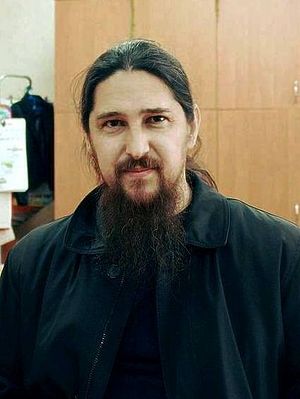 Priest Dimitry Shishkin The answer to the question, “To what degree can the Church be involved in politics?” cannot be unambiguous, at the least because everyone is different. Some don’t care about politics, others are interested in it as much as it is part of their civic responsibility, and others are directly involved in political activity and work in this field. What is clear is that politics is a part of public and state life—an integral and essential part. That is why it surprises me when some try to “separate” politics from the Church, asserting that the Church has nothing to do with politics. Of course, that is not true. It is simply because the Church embraces all its members, and there are politicians of various degrees of influence on international and regional processes among them.
Priest Dimitry Shishkin The answer to the question, “To what degree can the Church be involved in politics?” cannot be unambiguous, at the least because everyone is different. Some don’t care about politics, others are interested in it as much as it is part of their civic responsibility, and others are directly involved in political activity and work in this field. What is clear is that politics is a part of public and state life—an integral and essential part. That is why it surprises me when some try to “separate” politics from the Church, asserting that the Church has nothing to do with politics. Of course, that is not true. It is simply because the Church embraces all its members, and there are politicians of various degrees of influence on international and regional processes among them.
In any case, a Church person in politics will strive to keep the Gospel commandments in his activity, and it is certain to have a positive effect on the general state of society’s spiritual and moral life. At the same time, the influence of politics on the Church is intolerable, as is the involvement of Church figures and clergy in political bickering and struggle. Likewise, it doesn’t become Orthodox laypeople to get mixed up in heated confrontations or prefer one or another political paradigm to the eternal Truth of the Kingdom of God. That is, whatever political party agenda an Orthodox Christian may support, he should remain outside personal infighting.
That becomes ever more evident nowadays, when the political structure of the leading world powers, based on liberal and democratic values, is cracking at the joints.
Last week the Sotheby’s London auction sold a Banksy painting, “Devolved Parliament”, for $12 million. It depicts the British Parliament—the cradle of liberalism—with chimpanzees instead of MPs. We should explain who Banksy is and why his painting has been valued so highly. Banksy is the pseudonym of an anonymous street artist who has been trying to attract attention to the most pressing issues of modern times by his paintings. The value of this painting is certainly explained by the personality of Banksy, but also by the significance of the phenomenon it depicts.
The fact is that not only is Banksy’s canvas relevant and reflects the current crisis in Parliament, it also shows the deadlock and the end of the era of liberalism. Freedom of self-expression and debate has led society not to knowledge of the truth but to total spiritual and moral degradation, and the only way out will be the transformation of life by repentance.
By the way, the saying of St. Theodore the Studite about the multi-party system, one of the fundamental principles of modern parliamentarism, is very interesting: “The voice of our Lord Jesus Christ proclaimed that Every kingdom divided against itself is brought to desolation (Mt. 12:25). Dual authority is already multiple authority. Multiple authority gives rise to parties, and parties cause division and corruption” (Philokalia, vol. 4, 41/1).
When it comes to Russia, which in its time adopted the “advanced principles of political structure” from the West, Holy Hierarch Seraphim (Sobolev) made an accurate observation that the root of all the tragedies that befell this country over the twentieth century was in that we “replaced the religious and moral ideal with the political one”. That is, we got carried away with the building of the “right” socio-political system instead of bothering to nurture human hearts in the Gospel spirit.
The following words of the Apostle Paul can serve as the main guideline in both foreign and internal policies for us as for a nation that strives to preserve its Orthodox identity: This I say therefore, and testify in the Lord, that ye henceforth walk not as other Gentiles walk, in the vanity of their mind, Having the understanding darkened, being alienated from the life of God through the ignorance that is in them, because of the blindness of their heart: Who being past feeling have given themselves over unto lasciviousness, to work all uncleanness with greediness (Eph. 4:17-19).
In a word, it can be said that the influence of the Church on politics is salutary and desirable, while the opposite is intolerable and, frankly, impossible. Because the Church is not just the assembly of the faithful, but also the pillar and ground of the truth (1 Tim. 3:15), and the fulness of Him that filleth all in all (Eph. 1:23). The Church is Christ Himself, and Jesus Christ the same yesterday, and to day, and for ever (Heb. 13:8).

